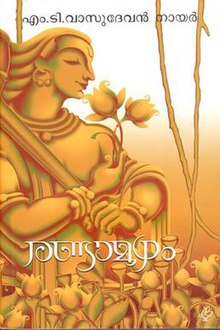
The Mahābhārata is one of the two major Smriti texts and Sanskrit epics of ancient India revered in Hinduism, the other being the Rāmāyaṇa. It narrates the events and aftermath of the Kurukshetra War, a war of succession between two groups of princely cousins, the Kauravas and the Pāṇḍavas.
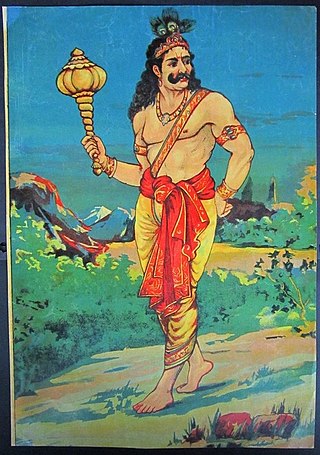
Bhima, also known as Bhimasena, is a divine hero and one of the most prominent figures in the Hindu epic Mahabharata, renowned for his incredible strength, fierce loyalty, and key role in the epic’s narrative. As the second of the five Pandava brothers, Bhima was born to Kunti—the wife of King Pandu—through the blessings of Vayu, the wind god, which bestowed upon him superhuman strength from birth. His rivalry with the Kauravas, especially Duryodhana, defined much of his life, with this tension ultimately erupting in the Kurukshetra War, where Bhima killed all hundred Kaurava brothers.
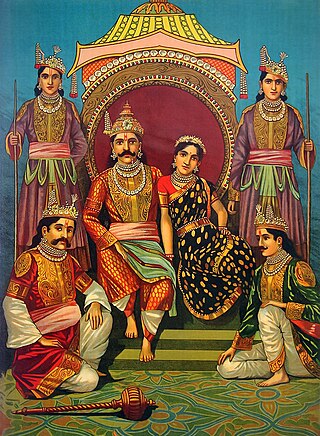
The Pandavas is a group name referring to the five legendary brothers, Yudhishtira, Bhima, Arjuna, Nakula and Sahadeva, who are central figures of the Hindu epic Mahabharata. They are acknowledged as the sons of Pandu, the King of Kuru, but were fathered by different Devas (gods) due to Pandu's cursed inability to naturally conceive children. In the epic, the Pandavas married Draupadi, the princess of Panchala, and founded the city of Indraprastha after the Kuru Kingdom was split to avoid succession disputes. After the split, the other part of the kingdom was ruled by their cousins, the Kauravas. However, the Pandavas lost their kingdom to Duryodhana when Yudhishtira gambled it away during a game of dice. The bet Yudhishtira agreed to was that the Pandavas would hand the kingdom to the Kauravas and go into exile for 13 years. After this time the Kauravas refused to return the kingdom. As a result, the Pandavas waged a civil war against their extended family, and this conflict was known as the Kurukshetra War. With the help of the god Krishna, the Pandavas eventually won the war with the death of the Kauravas, albeit at great cost.
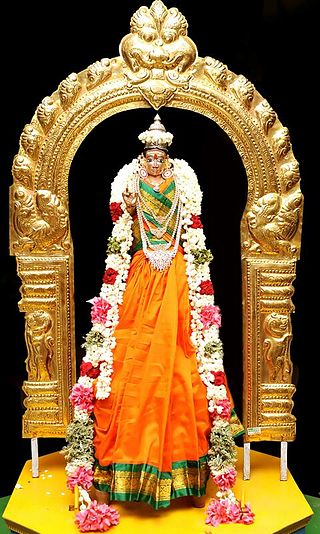
Draupadi, also referred to as Krishnā, Panchali, and Yajnaseni, is the main female protagonist of the ancient Indian epic Mahabharata, and the wife of the five Pandava brothers—Yudhishthira, Bhima, Arjuna, Nakula, and Sahadeva. She is noted for her beauty, courage, and polyandrous marriage.
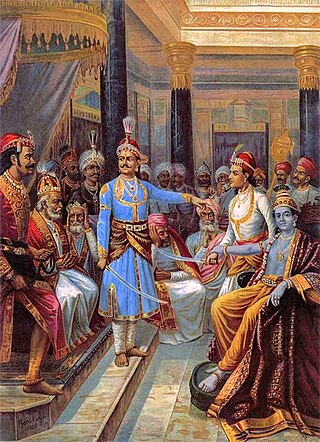
Duryodhana, also known as Suyodhana, is the primary antagonist in the Hindu epic Mahabharata. He was the eldest of the Kauravas, the hundred sons of the king Dhritarashtra and his queen Gandhari.

Karna, also known as Vasusena, Anga-Raja, Sutaputra and Radheya, is one of the major characters in the Hindu epic Mahābhārata. He is the son of Surya and princess Kunti. Kunti was granted the boon to bear a child with desired divine qualities from the gods and without much knowledge, Kunti invoked the sun god to confirm it if it was true indeed. Karna was secretly born to an unmarried Kunti in her teenage years, and fearing outrage and backlash from society over her premarital pregnancy, Kunti had to abandon the newly born Karna adrift in a basket on the Ganges. The basket is discovered floating on the Ganges River. He is adopted and raised by foster Suta parents named Radha and Adhiratha Nandana of the charioteer and poet profession working for king Dhritarashtra. Karna grows up to be an accomplished warrior of extraordinary abilities, a gifted speaker and becomes a loyal friend of Duryodhana. He is appointed the king of Anga (Bihar-Bengal) by Duryodhana. Karna joins the losing Duryodhana side of the Mahabharata war. He is a key antagonist who aims to kill Arjuna but dies in a battle with him during the Kurushetra war.

Droṇa, also referred to as Dronacharya, is a major character of the Hindu epic Mahabharata.

Yudhishthira also known as Dharmaraja, was the king of Indraprastha and later the King of Kuru Kingdom in the epic Mahabharata. He is the eldest among the five Pandavas, and is also one of the central characters of the epic.

Sahadeva was the youngest of the five Pandava brothers in the ancient Indian epic, the Mahabharata. He and his twin brother Nakula were the sons of Madri, one of the wives of the Pandava patriarch Pandu, and Ashvini Kumaras, the divine twin physicians of the gods, whom she invoked to beget her sons due to Pandu's inability to progenate. Kunti, Sahadeva's step-mother, loved him the most despite his birth to Madri. Sahadeva is renowned for his wisdom, knowledge of astrology, and skill in swordsmanship.

Bharatayuddha or Bharat Yudha is a term used in Indonesia for the Kurukshetra War, and to describe the Javanese translation and interpretation of the Mahabharata. The Mahabharata was translated into (old) Javanese under the reign of king Dharmawangsa of Medang. The current version was started by Sedah in 1157, and finished by mpu Panuluh. Mpu Panuluh also wrote the Kakawin Hariwangsa.

The Kurukshetra War, also called the Mahabharata War, is a war described in the Hindu epic poem Mahabharata, arising from a dynastic struggle between two groups of cousins, the Kauravas and the Pandavas, for the throne of Hastinapura. The war is used as the context for the dialogues of the Bhagavad Gita.

Jayadratha is the king of the Sindhu kingdom featured in the Mahabharata. He was married to Dushala, the only sister of the hundred Kaurava brothers. The son of the king Vriddhakshatra, he is killed by Arjuna. He has a son named Suratha.

Kunti, born Pritha, was the queen of Kuru in the Hindu epic Mahabharata. Kunti was married to Pandu and is the mother of Karna, Yudhishthira, Bhima, and Arjuna. She is depicted to possess beauty, intelligence and shrewdness.

Mahabharat is an Indian Hindi-language epic television series based on the ancient Sanskrit epic Mahabharata. The original airing consisted of a total of 94 episodes and were broadcast from 2 October 1988 to 24 June 1990 on Doordarshan. It was produced by B. R. Chopra and directed by his son, Ravi Chopra. The music was composed by Raj Kamal. The script was written by Pandit Narendra Sharma and the Hindi/Urdu poet Rahi Masoom Raza, based on the epic by Vyasa. Costumes for the series were provided by Maganlal Dresswala. The serial claims to have used the Critical Edition of Bhandarkar Oriental Research Institute as its basic source with Vishnu Sitaram Sukthankar and Shripad Krishna Belwalkar as its primary editor.

Virata Parva, also known as the “Book of Virata”, is the fourth of eighteen books of the Indian epic Mahabharata. Virata Parva traditionally has 4 parts and 72 chapters. The critical edition of Virata Parva has 4 parts and 67 chapters.
In the Hindu epic Mahabharata, Vikarna was the third Kaurava, a son of Dhritarashtra and Gandhari, and a brother to the crown prince Duryodhana. Vikarna is also referred to as the most reputable of the Kauravas. Vikarna was the only Kaurava who opposed the humiliation of Draupadi, the wife of his cousins of the Pandavas after Yudhisthira lost her freedom in a game of dice to Duryodhana.

Mahabharat is a 2013 Indian epic mythological television series based on the Sanskrit epic Mahabharata. It aired from 16 September 2013 to 16 August 2014 on Star Plus. The series is available digitally on Disney+ Hotstar. Produced by Swastik Productions Pvt. Ltd, it starred Saurabh Raj Jain, Pooja Sharma, Shaheer Sheikh and Aham Sharma.

Mahabharat is a 2013 Indian Hindi-language animated film, directed by Amaan Khan and based on the Hindu epic of the same name. The film is produced by Kushal Kantilal Gada and Dhaval Jayantilal Gada. The film was a Christmas release on 27 December 2013. Several actors like Amitabh Bachchan, Sunny Deol, Ajay Devgn, Anil Kapoor, Manoj Bajpayee, Jackie Shroff, Vidya Balan, Deepti Naval were signed up for the characters in the film. It is touted as the most expensive animated film in Bollywood. The movie tells the story of the Indian epic Mahabharata. It received mixed reviews, with praise for its voice acting, but criticism for its animations.
V. A. Shrikumar is an Indian ad film, feature film director and businessman. He has directed more than 400 commercials for various brands. He is the chairman and managing director of Push Integrated Communications, a marketing company. He directed his debut feature film Odiyan in 2018. Despite mixed reviews, it was a major commercial success at the box office, becoming one of the highest-grossing Malayalam films of all time. Before the arrival of K.G.F: Chapter 2, Odiyan was the holder of the first day's highest box office opener in Kerala, by collecting more than 7 crores.
